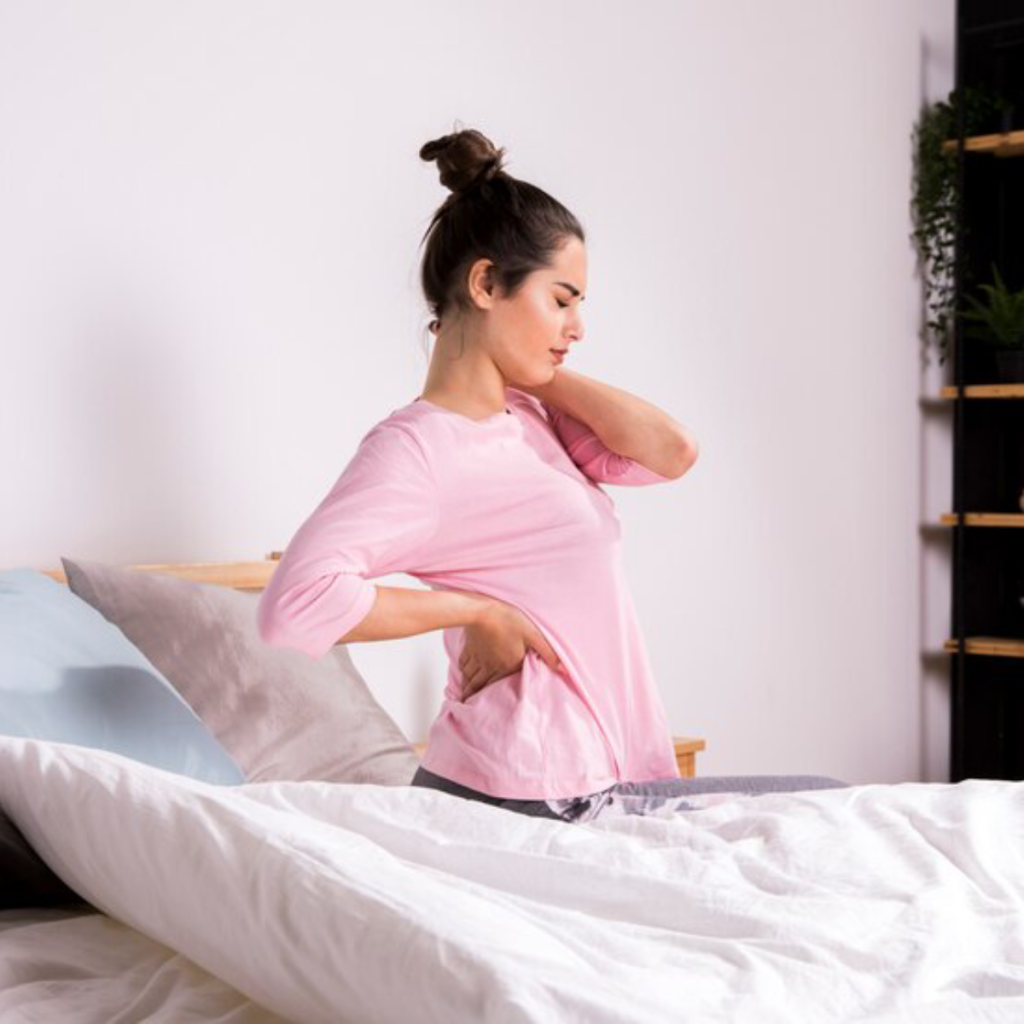Discover how long back pain can persist after giving birth and learn effective strategies for managing and alleviating postpartum back pain.
How Long Can Back Pain Last After Giving Birth?
Congratulations on the arrival of your little bundle of joy! While the joy and excitement of becoming a parent can be an overwhelming experience, you may also be facing a not-so-pleasant side effect – postpartum back pain. Don’t fret, though! In this article, we’ll dive into the depths of postpartum back pain, its causes, duration, influencing factors, treatment options, and prevention strategies. So let’s get started on this journey towards a pain-free back!

Understanding Postpartum Back Pain
After childbirth, your body goes through various changes as it recovers and adapts to the new role of motherhood. One of these changes can be the onset of postpartum back pain. Let’s embark on a mini anatomy lesson to uncover the reasons behind this discomfort.
The Anatomy of Postpartum Back Pain
During pregnancy, your body undergoes numerous physical changes to accommodate your growing baby. These changes can result in stress on the muscles, ligaments, and joints in your back, leading to postpartum back pain. Additionally, the hormonal fluctuations experienced during pregnancy can further contribute to this discomfort.
When you are pregnant, your body releases a hormone called relaxin. This hormone helps to loosen the ligaments in your pelvis, allowing for easier childbirth. However, relaxin can also affect the ligaments in your back, making them more prone to strain and injury. As a result, you may experience postpartum back pain as your body adjusts to the changes brought on by relaxin.
Furthermore, the weight gain during pregnancy places additional stress on your back. As your baby grows, your center of gravity shifts forward, causing your back muscles to work harder to maintain balance. This increased workload can lead to muscle fatigue and discomfort.
Common Causes of Postpartum Back Pain
Now that we have a better understanding of the anatomy, let’s explore some common causes of postpartum back pain. The physical demands of pregnancy and childbirth can put a strain on your lower back. Activities such as carrying your little one, breastfeeding, and bending over to pick up toys can aggravate the pain. Poor posture, lack of exercise, and hormonal imbalances can also play a role in prolonging the duration of your discomfort.
Carrying your baby can be a joyful experience, but it can also take a toll on your back. The constant lifting and holding can strain your back muscles, especially if you are not using proper lifting techniques. It is important to engage your core muscles and lift with your legs to minimize the strain on your back.
Additionally, breastfeeding can contribute to postpartum back pain. The act of nursing requires you to sit in a hunched position for extended periods of time, which can lead to muscle imbalances and discomfort. It is crucial to maintain good posture while breastfeeding, using pillows or a nursing chair for support.
Furthermore, the lack of exercise during the postpartum period can exacerbate back pain. Many new mothers are focused on caring for their newborn and may neglect their own physical well-being. However, incorporating gentle exercises, such as walking or postnatal yoga, can help strengthen your back muscles and alleviate pain.
Hormonal imbalances can also contribute to postpartum back pain. After childbirth, your hormone levels fluctuate as your body adjusts to its non-pregnant state. These hormonal changes can affect the ligaments and muscles in your back, making them more susceptible to strain and injury. It is important to be patient with your body as it goes through these hormonal shifts and to seek appropriate treatment if the pain persists.
Duration of Back Pain After Childbirth
Postpartum back pain can vary in duration depending on various factors. Let’s take a closer look at these different periods of discomfort.
Immediate Postpartum Period
During the immediate postpartum period, your body is healing from the birthing process. It’s not uncommon to experience back pain during this time, but fear not – it typically fades away within a few weeks. Rest assured that snuggling up with your little one and taking it easy will help speed up the healing process.
During the immediate postpartum period, your body undergoes significant changes as it recovers from the physical stress of childbirth. The ligaments and muscles that were stretched and strained during labor are gradually returning to their pre-pregnancy state. This process can cause discomfort and pain in various areas, including the back.
Additionally, hormonal changes play a role in postpartum back pain. The levels of relaxin, a hormone that helps loosen the ligaments in the pelvic area during pregnancy, remain elevated for a while after giving birth. This can affect the stability of the spine and contribute to back pain.
It’s important to note that the intensity and duration of back pain during the immediate postpartum period can vary from woman to woman. Factors such as the type of delivery, the presence of any complications, and individual healing abilities can all influence the duration of discomfort.
Long-Term Postpartum Period
For some new moms, postpartum back pain may persist beyond the initial weeks. While it can be frustrating, it’s essential to remember that every person’s recovery journey is unique. Most cases of long-term postpartum back pain resolve within three to six months, especially with proper care and attention.
If you find yourself experiencing prolonged postpartum back pain, it’s crucial to seek medical advice. A healthcare professional can help identify any underlying issues that may be contributing to the discomfort. They may recommend specific exercises, physical therapy, or other interventions to alleviate the pain and support your recovery.
It’s worth noting that the demands of caring for a newborn can also impact your back health. Frequent lifting, bending, and carrying can strain the muscles and exacerbate existing back pain. Taking breaks, practicing good posture, and engaging in gentle exercises can help prevent further discomfort.
Remember, postpartum back pain is a common occurrence, and you’re not alone in your experience. Connecting with other new moms, whether through support groups or online communities, can provide valuable insights and emotional support as you navigate this phase of your recovery.
Factors Influencing the Length of Back Pain
Numerous factors can influence how long postpartum back pain lasts for each individual. Let’s explore two significant contributors – physical and psychological factors.

Physical Factors
Your physical wellbeing plays a crucial role in the duration of postpartum back pain. Maintaining a healthy weight, performing gentle exercises, and practicing good posture can aid in alleviating the discomfort. Remember to consult with your healthcare provider before engaging in any new exercise routine.
In addition to these factors, there are other physical aspects that can impact the length of postpartum back pain. One such aspect is the type of delivery you had. Women who undergo a cesarean section may experience longer-lasting back pain due to the surgical incision and the subsequent healing process. On the other hand, women who have a vaginal delivery may still experience back pain, but it may resolve more quickly.
Another physical factor to consider is your overall fitness level before pregnancy. Women who were physically active and had strong core muscles prior to pregnancy may experience less severe and shorter-lasting back pain compared to those who were less active. This is because a strong core provides better support for the spine and reduces the strain on the back muscles.
Psychological Factors
Motherhood is an exciting and sometimes overwhelming experience. The demands of caring for a newborn can lead to stress and emotional strain, both of which can contribute to back pain. Ensuring you have support, practicing self-care, and seeking emotional support if needed can positively impact your recovery.
Furthermore, it is important to acknowledge the role of hormonal changes in postpartum back pain. During pregnancy, the body produces relaxin, a hormone that helps loosen the ligaments in the pelvis to prepare for childbirth. However, this hormone can also affect other joints and ligaments in the body, including those in the back. The lingering effects of relaxin can contribute to ongoing back pain in the postpartum period.
In addition to hormonal changes, sleep deprivation is another psychological factor that can prolong postpartum back pain. Newborns require frequent feeding and care, often disrupting a mother’s sleep patterns. Lack of sleep can lead to muscle tension and fatigue, exacerbating existing back pain or delaying its recovery.
Lastly, it is important to address the potential impact of postpartum depression on back pain. Postpartum depression is a mood disorder that can affect new mothers, leading to feelings of sadness, hopelessness, and fatigue. These emotional symptoms can contribute to increased muscle tension and overall discomfort, potentially prolonging the duration of back pain.
In conclusion, the length of postpartum back pain can be influenced by various physical and psychological factors. By addressing these factors, seeking appropriate support, and taking care of your physical and emotional well-being, you can help alleviate and potentially shorten the duration of postpartum back pain.
Treatment Options for Postpartum Back Pain
Now that we’ve covered the causes and duration of postpartum back pain, let’s focus on the treatment options available to kiss that pain goodbye!
Non-Medical Interventions
Non-medical interventions can be a great starting point for managing postpartum back pain. These include gentle exercises, hot and cold therapy, practicing good posture, and engaging in activities that promote relaxation, such as yoga or swimming. Consulting with a physical therapist can also provide you with targeted exercises to strengthen and stretch your back muscles.
Medical Interventions
If your back pain persists or becomes severe, it may be time to explore medical interventions. Consulting with your healthcare provider will help determine the appropriate course of action. This may include medications, injections, or in rare cases, surgery. Remember, your healthcare provider is your trusted guide in finding the best solution for your unique situation.
Prevention Strategies for Postpartum Back Pain
Prevention is always better than cure, and the same applies to postpartum back pain. Let’s explore some strategies to help keep the pain at bay.
Pre-Birth Prevention Strategies
Preparing your body before giving birth can contribute to a smoother postpartum recovery. Engaging in regular exercise, practicing proper posture, and attending prenatal yoga classes can strengthen your back muscles and reduce the chances of experiencing postpartum back pain.
Post-Birth Prevention Strategies
Once your bundle of joy has arrived, it’s essential to continue caring for your back. Avoiding heavy lifting, practicing good posture, and using supportive devices such as pillows and ergonomic chairs can help prevent postpartum back pain. Consider seeking the assistance of a postpartum fitness specialist who can guide you through exercises specifically designed for new moms.
Remember, new mom, you’re not alone in this journey. Postpartum back pain can be a temporary guest, and with proper care and patience, you’ll bid it farewell in due course. So, embrace the joy of motherhood, confidently pick up your little one, and conquer the world with a pain-free back!



